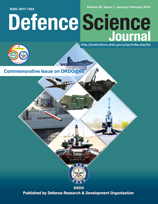Command Agent Belief Architecture to Support Commander Decision Making in Military Simulation
DOI:
https://doi.org/10.14429/dsj.68.11375Keywords:
C2 structure, Intelligent agents, Aggregation and disaggregation, Command agent, Team-Oriented programming, Belief propagationAbstract
In the war, military conflicts have many aspects that are consistent with complexity theory e.g., the higher commander’s decision is directed at animate entity that react under hierarchical and self-organised structure in decentralised command and control for the collectivist dynamism of decomposed elements due to nonlinear complexity of warfare on the battlefield. Agent technology have been found to be suitable for modelling tactical behaviour of entities at multiple level of resolution under hierarchical command and control (C2) structure and provide a powerful abstraction mechanism required for designing simulations of complex and dynamic battlefield situations. Intelligent agents can potentially reduce the overhead on such experiments and studies. Command agents, plan how to carry out the operation and assign tasks to subordinate agents. They receive information from battlefield environment and use such information to build situation awareness and also to respond to unforeseen situations. In the paper, we have proposed a mechanism for modelling tactical behaviour of an intelligent agent by which higher command level entities should be able to synthesize their beliefs derived from the lower level sub ordinates entities. This paper presents a role-based belief, desire and intention mechanism to facilitate in the representation of military hierarchy, modelling of tactical behaviour based on agent current belief, teammate’s belief propagation, and coordination issues. Higher commander can view the battlefield information at different levels of abstraction based on concept of aggregation and disaggregation and take appropriate reactive response to any unforeseen circumstances happening in battlefield.
Downloads
Published
How to Cite
Issue
Section
License
 Where otherwise noted, the Articles on this site are licensed under Creative Commons License: CC Attribution-Noncommercial-No Derivative Works 2.5 India
Where otherwise noted, the Articles on this site are licensed under Creative Commons License: CC Attribution-Noncommercial-No Derivative Works 2.5 India


